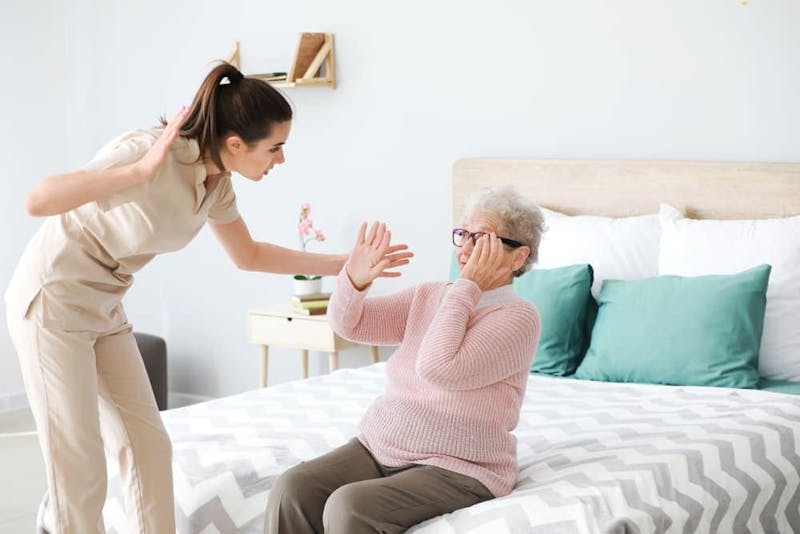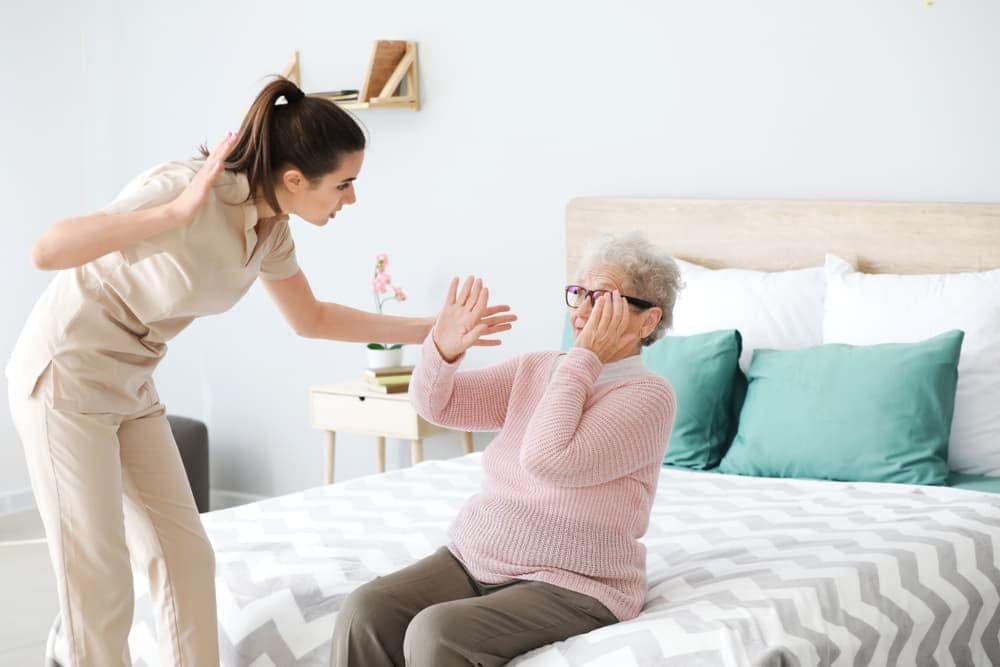
More than 2.5 million people over the age of 50 live in Washington state, and that number grows every day. As life expectancy increases, more and more seniors and adults with disabilities need to turn to nursing homes. Some move in for the long term because a physical or mental disability prevents them from caring for themselves at home. Others stay only a few days or weeks while they recover from surgery, illness, or injury.
These residential care facilities provide patients with personal care, meals, medical services, and round-the-clock supervision. All nursing home residents, whether they’re there for a few weeks or the rest of their lives, can’t fend for themselves. They depend entirely on the facility’s staff and management for their safety and well-being, which makes them vulnerable to nursing home abuse.
Most nursing home staff are nurses, nursing assistants, and personal care aides, positions requiring direct patient interaction. Other staff include custodians, cooks, and administrators. Doctors, occupational therapists, and other professionals come onsite as needed to care for residents. Maintenance workers and technicians also visit facilities as needed. And many nursing home residents are regularly visited by friends and family.
Patients’ families who discover abuse in a nursing home understandably want to take action against the facility.
In one notorious case, a nursing home resident in Seattle alerted a family member that an employee had repeatedly raped her. The family placed a hidden camera in the patient’s room to document the abuse. The horrifying footage led to an admission by the nursing home’s management that it had failed to provide a safe environment for residents and an $8 million settlement from the facility’s insurance company.
The funds should help the patient live comfortably and get the care she needs to recover from her abuse, although nothing will ever make up for what she went through. If your loved one has suffered, contact a Federal Way nursing home negligence lawyer.
What Types of Abuse Can Happen in Nursing Homes?
Nursing home residents are an extremely vulnerable population, and abuse is common.

Nursing home abuse can take many forms, including:
- Physical abuse, such as punching, slapping, kicking, or pushing a patient, or excessive restraint
- Emotional and psychological abuse, including threatening, insulting, or isolating patients from friends and loved ones
- Sexual abuse, such as rape or forcing patients to take part in or watch sexual acts
- Financial abuse, such as stealing a patient’s money or belongings, forging checks, taking their retirement benefits, or using their credit cards or bank accounts without permission
- Neglect, including withholding food, medication, or care
If you or someone you love has been abused in a nursing home, report the issue to Washington’s Aging and Long-Term Support Administration as soon as possible. The agency will investigate your complaint and gather evidence, which could lead to criminal charges against the abuser.
You may also choose to file a civil lawsuit against the nursing home. In addition to holding the nursing home accountable for the abuse, a court could find you or your loved one eligible for financial compensation.
How Common Is Nursing Home Abuse?
Because nursing home abuse tends to be underreported, it’s hard to know exactly how widespread it is. In a World Health Organization study, however, nearly two-thirds of nursing home staff admitted to abusing their patients during the preceding year. The same study found that one in six people over age 60 were abused in a community-based setting that year.
Human Rights Watch believes the rate of abuse in nursing homes increased during the period covered by the WHO study due to stressors caused by the Covid-19 pandemic, but points out that abuse rates were already too high.
A few factors make nursing home patients especially vulnerable. These patients may not be physically able to fight back against someone trying to hurt them.
Because they depend on facility staff for their care and comfort, they may feel they have to go along with what is happening or risk their safety. The WHO study even speculates that ageism—devaluing people because they’re older—contributes to the rampant abuse in nursing home settings.
Signs of Nursing Home Abuse or Neglect
It’s not always easy to detect or prevent abuse of nursing home residents. The Washington State Department of Social and Health Services inspects nursing homes and makes the results available to the public.
Medicare also maintains an online search tool that provides more information about nursing homes, and the non-profit news agency ProPublica provides a similar service.
You can also look online for reviews of the facility and read comments from patients and their families to get more information, though you usually cannot verify their accuracy.
But good reviews and inspection reports don’t necessarily mean abuse can’t happen at a particular facility. When your loved one is in a nursing home, call and visit them regularly, listening for complaints and keeping an eye out for suspicious details.
These can include:
- Bruises, cuts, or welts
- Broken bones and sprains
- Rope marks or other signs of restraints
- Bed sores
- Dehydration or malnutrition
- Unexplained weight loss
- Unexplained sexually transmitted infections
- Bleeding, sores, bruising, or other signs of damage around the genitals
- Unexplained blood stains on clothing, especially underwear
- Seeming overmedicated or under-medicated
- Mood changes, especially depression and anxiety
- Isolation from family, friends, or other residents
- Efforts to avoid a particular staff member or another resident
- Agitation or confusion
- Unexplained changes to financial accounts
- Poor hygiene or unsanitary living conditions
- Sudden changes in behavior, such as not wanting to be touched
Abuse can take many forms in the nursing home environment, and different individual victims will respond to it differently. If you notice any unexplained injuries or behavioral changes in a loved one in a nursing home, you should ask for an explanation.
Pay close attention to the answers to your questions. Staff may try to downplay abusive behavior or blame physical signs on a patient’s clumsiness. Keep notes detailing your observations, the patient’s statements, and the staff’s effort to explain the signs of abuse.
What to Do if You Suspect Nursing Home Abuse
If you suspect abuse in your loved one’s nursing home and worry about their safety, you can move them to a new facility. Since you may have to give notice 30 or 60 days before transferring them, initiate the process as soon as possible.
You’ll also want to report your suspicions to the state’s Aging and Long-Term Support Administration. Doing so will help protect other residents and start the process of holding the abuser accountable.
Finally, contact a lawyer to discuss filing a civil lawsuit over the abuse. Settlements from these can help victims and families get financial compensation and force the nursing home to reform. In these cases, find a lawyer with a dedicated practice area looking out for nursing home residents in that community.
What Makes the Nursing Home Responsible When for Patient Abuse?
Nursing home residents interact with nursing staff, aides, doctors, other patients and their visitors, contractors such as physical therapists or food service vendors, and maintenance workers. In a poorly supervised nursing home environment, all of these people can find opportunities to abuse patients.
In well-run nursing homes, the staff exercises a duty of care to their patients. They’re responsible for keeping residents safe by preventing abuse and neglect and providing care that meets professional standards. Nursing homes must run background checks on employees to ensure there’s no history of misconduct.
Vendors or subcontractors who work with nursing homes should meet this same level of due diligence. No one runs a background check on visitors to the facility, so nursing homes have an additional responsibility to supervise their movements and interactions with residents.
Failure to exercise this duty of care can be grounds for a lawsuit when patients are abused.
Taking Action When Nursing Home Abuse Occurs
It can be hard to know what to do when a vulnerable loved one is abused in their nursing home. You may feel anger, sadness, or fear for their safety. In this very stressful situation where the stakes are so high, you want to proceed correctly.
To begin, if your loved one is in immediate danger or needs urgent medical care, call 911. Next, contact an experienced nursing home abuse attorney. They can guide you through the reporting process, help gather and compile evidence of the abuse, and determine the most effective legal strategy for remedying the problem.
If a civil lawsuit is the right course of action for your situation, your lawyer can prepare and file the court documents and see the case through as your advocate. A civil lawsuit will have to show the nursing home breached its duty of care to the patient when it allowed the abuser to interact with the patient and failed to supervise its facilities adequately.
Documentation of the abuse, which your attorney will collect and submit as evidence, could include relevant medical records, pictures, the patient’s description of the abuse, witness testimony, and the nursing home’s history of violating state rules and standards.
In Washington, victims and their families must file their lawsuits within three years of discovering the abuse. This time limit, known as a statute of limitations, pushes claimants to take action quickly while the evidence and witnesses’ memories are still fresh.
Once the lawsuit is filed in a Washington court, the nursing home or staff must respond. After their response, the lawsuit will enter the discovery phase, where the plaintiff and the defendant share their evidence and information about the allegations.
If the nursing home’s legal team wants to avoid a trial, they’ll likely offer you a financial settlement during this period.
If you accept, you’ll have to sign a settlement agreement.
If you do not, the lawsuit may go to trial, either in front of a judge and jury or just a judge. They’ll hear the evidence and decide whether the defendant is responsible for your loved one’s abuse. If the judge or jury finds in your favor, they’ll award you compensation for your expenses, legal fees, and pain and suffering
Very few cases go all the way to trial. Most are resolved through a settlement agreement, especially when there’s clear evidence of abuse or negligence and the outcome of a trial seems certain.
Cases that go to trial can drag on, but sometimes, they’re the only way to get justice.
Regardless of whether you settle or go to trial, your attorney will work to get you the compensation you and your loved one deserve.
If you recover damages in the settlement or verdict, the party found liable for the abuse—such as the nursing home or the individual staff member, depending on your situation—must pay them. You may receive the damages in a lump-sum payment or in monthly or annual installments as part of a structured settlement agreement.
Judges and attorneys can make legal mistakes, such as not allowing certain evidence as part of the trial. If a legal error keeps you from getting the outcome you deserve, you can appeal to a higher court for a reconsideration of the verdict. The higher court will review the case and decide to either uphold the original verdict, issue a new one, or remand the case for another trial. You cannot appeal if you sign a settlement agreement.
Contact Us to Take Action

Nursing home residents deserve respect and dignity. If a nursing home abused or neglected you or a loved one, a skilled personal injury lawyer can get the compensation you deserve for your pain, suffering, medical costs, and other expenses. A nursing home abuse and neglect lawyer will gather the evidence you need to file a lawsuit. Set up a consultation today.












